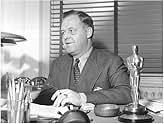Louis De Rochemont(1899-1978)
- Producer
- Director
- Writer
Louis de Rochemont, the maverick filmmaker and documentarian whose "The
Fighting Lady" (1944) won an Oscar, was born in Chelsea. Massachusetts
in 1899. He filmed his first newsreel when he was 12 years old and
established his reputation making March of Time newsreels in the 1930s.
His pre-World War II documentaries elucidating the dangers posed by
Adolf Hitler caused some to label him a red. His documentary productions won
two Academy Awards.
The de Rochemont-produced newsreel "Inside Nazi Germany," the January 1938 entry in the March of Time series, was called "the first commercially released anti-Nazi American motion picture." Although the newsreel begins with film actually shot inside Nazi Germany, the footage was bland and disappointing, so de Rochemont had the newsreel was spiced up with staged re-enactments using anti-Nazi German-Americans. German-American Bund-leader Fritz Kuhn, he German-born fascist personally detailed by Hitler to lead the American fascist effort, was cajoled into allowing the documentary-makers to stage some scenes at the Bund office. When upon viewing the finished product, Kuhn discovered he had been tricked, Walter Winchell reported that he was recorded screaming "I will be ruint. Ruint!" at a screening in the March of Time building.
De Rochemont and his wife, screen-writer Virginia Shaler, lived in Newington, New Hampshire on the Piscataqua River at the Seacoast. Though a continent away from Hollywood, De Rochemont produced motion pictures based on true stories in actual locations, often with local people in the cast. Aside from three spy films, his movies films typically dealt with controversial subjects, including labor relations and racism. These pioneering efforts gave him the sobriquet "father of the docu-drama."
De Rochemont was a pioneer in the production of wide-screen films, and he shot films in Cinerama, Todd-AO and other wide-screen processes. He died in New Hampshire in 1978 survived by his wife, a daughter and a son. Virginia Shaler lived in Portsmouth, New Hampshire until her death.
In 1993, his "Inside Nazi Germany," was named to the Library of Congress' National Film Preservation Board's National Film Registry.
The de Rochemont-produced newsreel "Inside Nazi Germany," the January 1938 entry in the March of Time series, was called "the first commercially released anti-Nazi American motion picture." Although the newsreel begins with film actually shot inside Nazi Germany, the footage was bland and disappointing, so de Rochemont had the newsreel was spiced up with staged re-enactments using anti-Nazi German-Americans. German-American Bund-leader Fritz Kuhn, he German-born fascist personally detailed by Hitler to lead the American fascist effort, was cajoled into allowing the documentary-makers to stage some scenes at the Bund office. When upon viewing the finished product, Kuhn discovered he had been tricked, Walter Winchell reported that he was recorded screaming "I will be ruint. Ruint!" at a screening in the March of Time building.
De Rochemont and his wife, screen-writer Virginia Shaler, lived in Newington, New Hampshire on the Piscataqua River at the Seacoast. Though a continent away from Hollywood, De Rochemont produced motion pictures based on true stories in actual locations, often with local people in the cast. Aside from three spy films, his movies films typically dealt with controversial subjects, including labor relations and racism. These pioneering efforts gave him the sobriquet "father of the docu-drama."
De Rochemont was a pioneer in the production of wide-screen films, and he shot films in Cinerama, Todd-AO and other wide-screen processes. He died in New Hampshire in 1978 survived by his wife, a daughter and a son. Virginia Shaler lived in Portsmouth, New Hampshire until her death.
In 1993, his "Inside Nazi Germany," was named to the Library of Congress' National Film Preservation Board's National Film Registry.




















